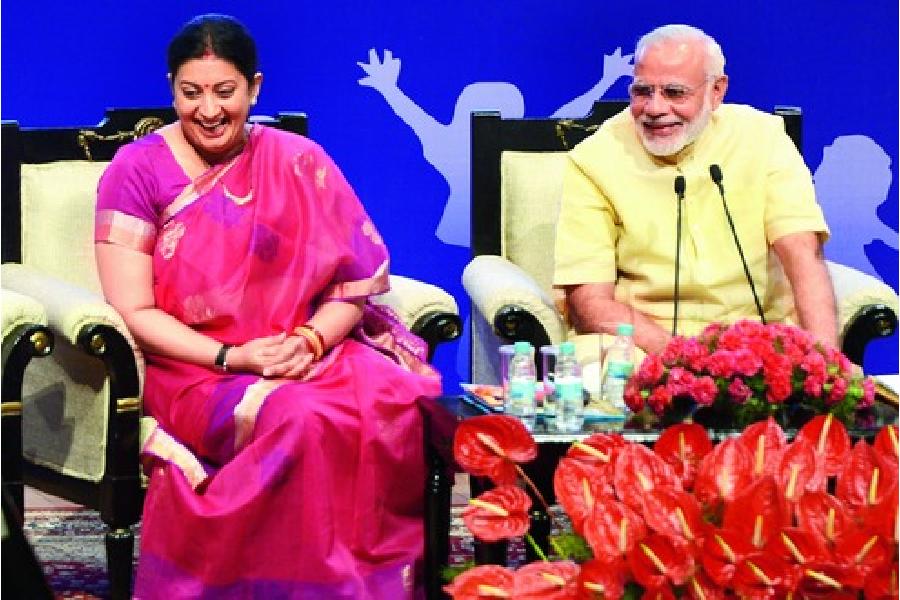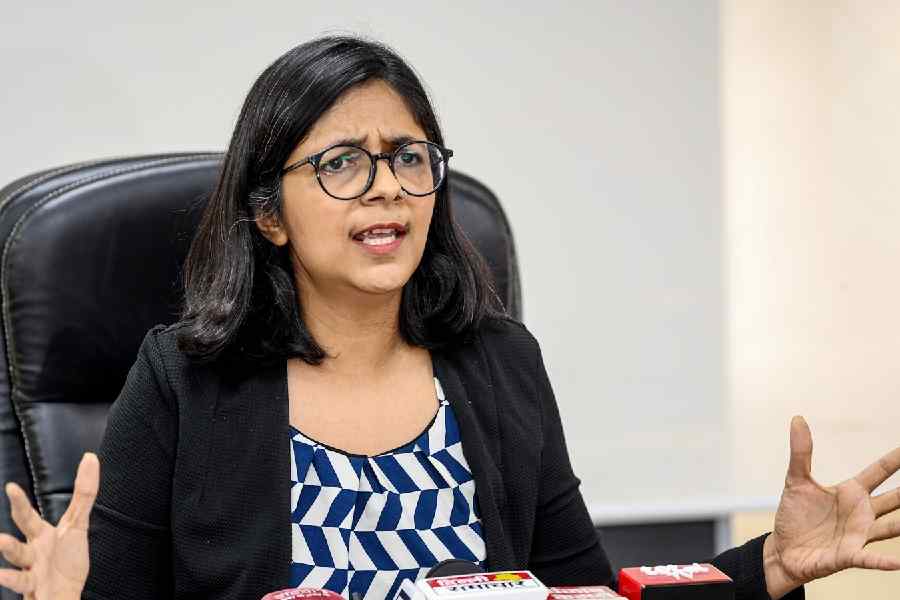Prime Minister Narendra Modi has been working for the welfare of women since coming to power, Union minister Smriti Irani said on Friday, underlining the need to celebrate the empowerment of women at the grassroots level.
Irani, however, refused to comment on the possibility of a legislation on the women's reservation bill being brought in Parliament, even though she said the BJP had supported as opposition when it was tabled in Rajya Sabha.
The women and child development minister was speaking at the launch of journalist Nidhi Sharma's book 'She, the Leader: Women in Indian Politics'.
BRS leader K Kavitha, Rajya Sabha MP John Brittas, and Lok Sabha MP Manish Tewari also attended the book launch.
Talking to the author, Irani said there has been a tectonic shift when it comes to women in politics. "One needs to celebrate that there is a quintessential surge in democracy from panchayat level. Even in general seats more and more women are participating," Irani said.
She said while there was a spike in the number of women at panchayats and Parliament, there was stagnation at the mid-level i.e state assemblies.
"There is a need to create a surge at the mid-level, at legislative assembly level. The focus has been dominantly on Parliament. We need to quantify what political power essentially is... Women have emerged as a significant vote bank which is making a huge difference," she said.
She said Prime Minister Narendra Modi has been driving the women's agenda, and brought to fore issues like toilets, which is a basic right.
"The man leading the female agenda is PM Modi. He is the one who said let's have Re 1 sanitary pad in Jan Aushadhi Kendras, he is the one who said there is a Bill for medical termination of pregnancy after 24 weeks, let's make sure it is passed..." she said.
"Would we want just a higher number of MPs or more participation in panchayats, organisational politics… More and more women interest groups are coming and speaking to parliamentary panels," she said.
Irani mentioned the three laws introduced in Lok Sabha to replace the IPC, CrPC and Indian Evidence Act, and said the acts prioritize women and children.
"One of the significant reflections on women power is in the three bills presented today," she said. "There is much that is yet to be done, but women have risen as an impactful vote bank. There is no political entity today that can ignore women," she said.
Asked about the women's reservation bill, Irani said the BJP had supported it when it was in opposition, but did not comment on the possibility of a similar legislation being brought.
"We supported the Women's Reservation Bill even when we were in Opposition. I was there in the House. I remember that irrespective of the political acrimony, the Bill was supported by the BJP in passage in Rajya Sabha," she said.
"The issue is again, what is it that I want for women? I want women in my country to have access to medical institutions... Today we have Ayushman Bharat... Nine crore women got cervical cancer checked... To negate what is happening in the country totally will be a bit impolite," she said.
Participating in a panel discussion later, Brittas said the number of women in politics will not increase unless a reservation is provided.
"Unless you have women in parliament, decision-making bodies, you can't bring change. Unless you bring women reservation bill, muscle power and money power will keep and number of women in Parliament will either remain stagnant or go down," he said.
On similar lines, Kavitha said, "The situation will remain the same as long as reservation is not implemented… In fact why 33 percent why not 50 percent?" she said.
"The only answer is, a government with such overwhelming majority should really pass the bill. Today they introduced three bills, if they want, they can pass it in minutes. So there is no commitment from BJP, that's very clear," she said.
Tewari, meanwhile, referred to the reservation for women in Panchayats and said, "The Congress had its own share of naysayers when panchayat reservation was introduced. The experiment has worked out well, it has strengthened our local bodies.
He said while in 2004, he had seen men representing women who were elected in meetings, the times have changed.
"We've come a long way since then. Basically it's a product of evolution, if you have a women's reservation bill, it will force the pace definitely… My own feeling is the trajectory seems to be in order. Increasingly you have a large number of women coming forward and taking part in public life," he said.
In 'She, the Leader: Women in Indian Politics', Sharma profiles seventeen trailblazing women politicians who have fought social inequalities and patriarchal attitudes and created their own brand of politics in the national discourse.
Indira Gandhi, Sucheta Kriplani, Sonia Gandhi, J. Jayalalithaa, Vasundhara Raje, Sheila Dikshit, Mayawati, Pratibha Patil, Sushma Swaraj, Mamata Banerjee, Brinda Karat, Ambika Soni, Smriti Z. Irani, Supriya Sule, Kavitha Kalvakuntla, Kanimozhi Karunanidhi, and Ampareen Lyngdoh are the leaders covered in the book.
Except for the headline, this story has not been edited by The Telegraph Online staff and has been published from a syndicated feed.












